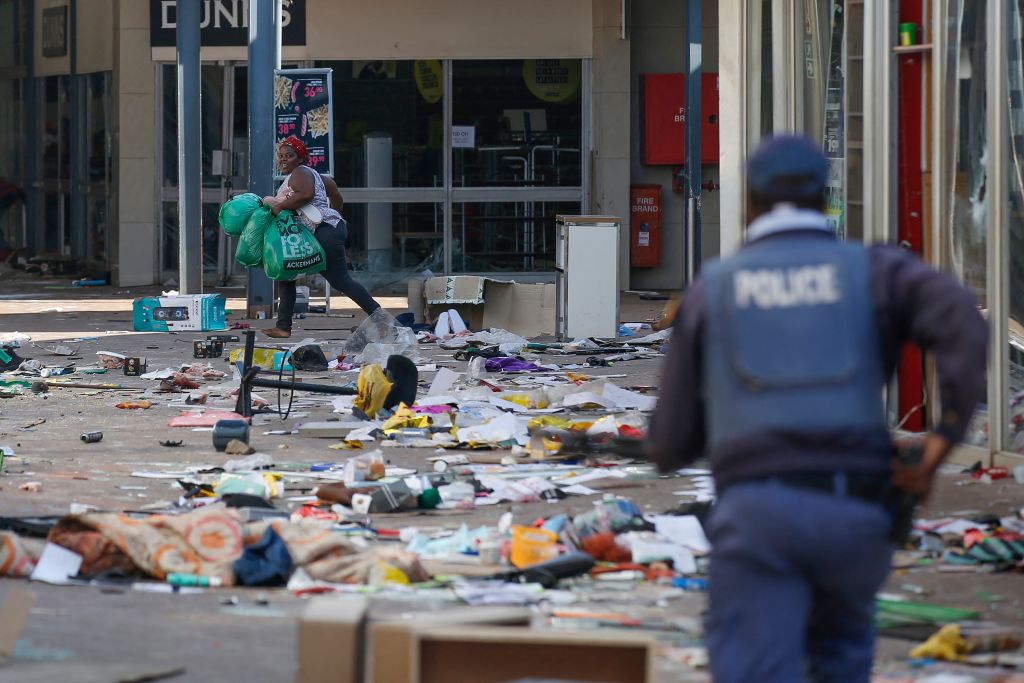ADF STAFF
The violence that engulfed South Africa in July 2021 shocked and traumatized the country. Many fear it could happen again if societal root causes are not addressed.
President Cyril Ramaphosa called the wave of violence that hit the country last year an “insurrection” and “a deliberate, coordinated and well-planned attack on our democracy.” He decried “opportunistic acts of looting.”
More than 350 people died, thousands were arrested and billions were lost in the economic damage.
The arrest and jailing of former president Jacob Zuma after he refused to testify in a corruption investigation was the spark that lit the fire. But observers point to deeper problems, including economic inequality and a mistrust of state institutions as the roots of the anger.
One year later, experts such as Sandy Africa warn that the ingredients for unrest remain, and the state security apparatus continues to lag in its capacity to respond.
An associate professor of political science at the University of Pretoria, Africa was chairperson of the expert panel appointed to investigate the July 2021 violence and assess the shortcomings of the South African security services’ response.
“South Africa can hopefully avoid a repeat of the events of July 2021,” she wrote in an article for The Conversation Africa online magazine. “But that calls for a recalibrated security sector which is effective, responsive, accountable, serving the country’s democracy and not the interests of a few who manipulate them for personal or partisan gain.”
The panel’s report, which was published in late November 2021, touched on the lingering impact of the events of July 2021 on all aspects of society.
The report said little had changed, accountability was sorely lacking and large numbers of citizens considered another uprising inevitable.
“The fear of many is that not only will a repeat of such violence find ground in the all-too-familiar contexts of negative political contestation, where certain interests take advantage of the levels of poverty, inequality, lack of service delivery and social tensions to advance their cause,” the panel wrote.
“There also is a worry that the violence has left behind a sense of uncertainty and vulnerability because of the ineffective response of the security services and an appetite for lawlessness by those who might feel emboldened by the apparent lack of state capacity.”
With high rates of violent crime and violent demonstrations, South Africa clearly has a security problem.
According to the Institute for Economics and Peace’s Global Peace Index, released in June 2022, South Africa ranks as the 23rd-worst country in the world in terms of safety and security.
In 2020, South Africa had a homicide rate of 33 people out of every 100,000 — triple the regional average — according to the United Nations Office on Drugs and Crime.
Gun control continues to be a major debate throughout the country.
Gareth Newham, an expert in crime and security at the Institute for Security Studies in Pretoria, called for “a major policy response” to organized crime.
“Effective intelligence is essential,” he told the British newspaper The Guardian. “There are only a certain number of people doing this, so it should be possible to proactively remove the weapons from society. But police don’t seem to even know what the problem is.”
A public report released in early July 2022 condemned both intelligence and security responses, saying police were caught by surprise and had “insufficient capacity” to handle the unrest.
“There was a failure by the intelligence structures to anticipate and respond adequately to the violence,” the report stated.
South Africa is known as one of the world’s most unequal societies, which was exacerbated by the pandemic. Children of lower-income families lost more than a year of schooling, while those from wealthy communities accessed online education.
Experts also have pointed to issues of corruption, poverty and health care as causes of the 2021 unrest, the worst violence the country has seen in the post-Apartheid era.
“Do you think you can defend a democracy in a nation that is sick?” said Dr. Rudo Mathivha at a conference in April 2022. “Start with the health of your citizens. Then start teaching them about democracy and debating it and being active about delivering it.”
Mathivha, head of critical care at the largest hospital in Africa, Chris Hani Baragwanath Hospital, spoke at the launch of Defend our Democracy Campaign’s national dialogue on democratic renewal.
As pressure for change in South Africa rises, the 2024 presidential election looms.
Among the recommendations of Sandy Africa’s panel, she urged the government to recalibrate the focus of its security services as a foundational way to regain the trust of citizens.
“South Africa needs a multi-pronged strategy to build peaceful, sustainable neighborhoods, communities, and a nation where the rule of law prevails,” she wrote. “New notions of security that reflect a people-centered ethos are needed.
“Methods aimed at deescalating conflict, engaging community leaders, and averting bloodshed are needed. This requires serious and dedicated security services and accountable political representatives to oversee the services to avoid abuses of power.”

